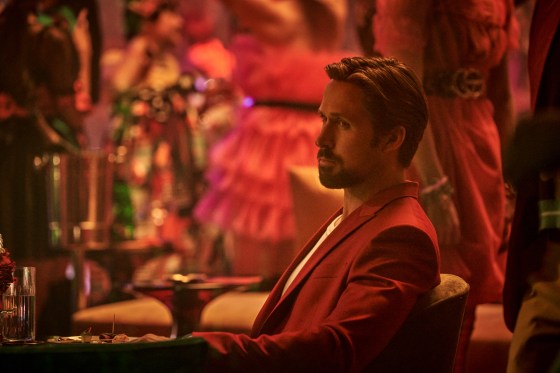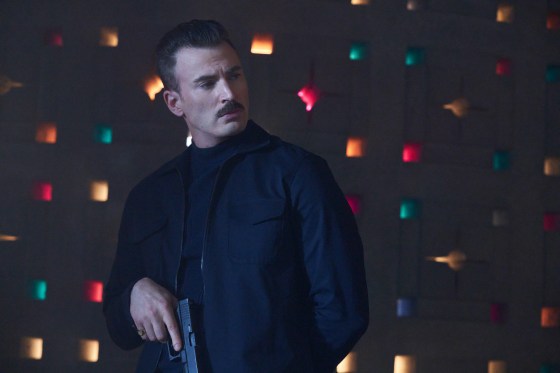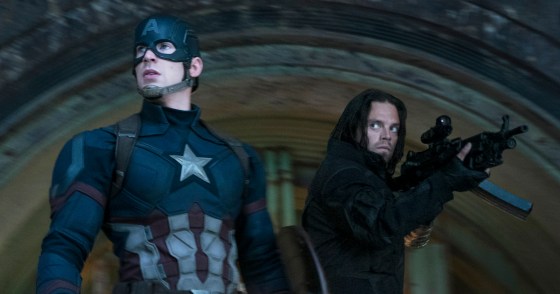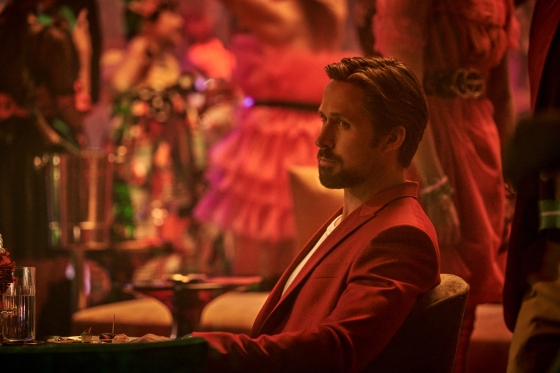It’s just another day at the office for the Gray Man. The CIA-trained assassin from the top-secret Sierra program has been sent to Bangkok and given a standard assignment: kill a bad guy. No further details are provided or required—the Sierra program furloughs American prisoners to serve in the CIA, and those details are above the Gray Man’s pay grade.
The assassin has his weapon trained on the glass ceiling above him, ready to take out the target standing there at a moment’s notice. Then a child appears next to the target and the Gray Man’s rigid moral compass redirects. To the great frustration of his superiors, he holds his fire.
[time-brightcove not-tgx=”true”]
The Gray Man of Netflix’s new movie—played by Ryan Gosling and true to his character in the 2009 Mark Greaney novel of the same name—treads a delicate line between the dark underbelly of his occupation and the harsh light of his signature strict moral code.
“Everyone in the movie is gray in some capacity, and I think it’s really reflective of the way that Anthony and I look at the world,” says Joe Russo, who directed the movie with his brother, Anthony Russo. “Not everyone is all good or all bad.”
The action thriller, which released in theaters on July 15 and will start streaming on Netflix on July 22, is a massive, nearly $200-million swing for Netflix, which has in recent months been struggling to maintain its onetime dominance. And if it does well—a standard which, given this era of hybrid release models and self-reported viewership metrics, may be hard for anyone outside of the streamer to discern—the Russo brothers have ideas for building out a “Gray Man” cinematic and TV universe. (Greaney has written 10 books in the series, with an eleventh due next month.)
After directing a string of action films, including four Marvel movies in five years, the Russo brothers have stayed true to form with The Gray Man in their mission to hold institutions to account even within the confines of a popcorn movie. In 2014’s Captain America: The Winter Soldier, Chris Evans’ ostensibly socially-conscious patriot fights back against a corrupt system. In The Gray Man, the institution at hand is the CIA. Although the CIA did not directly support or assist with the movie, the filmmakers did consult former CIA agents. (Greaney’s experience training with military and law enforcement also informed the source material). Viewed within the broader context of the last 60 years, The Gray Man speaks to shifting depictions of the CIA onscreen.
Sign up for More to the Story, TIME’s weekly entertainment newsletter, to get the context you need for the pop culture you love.
The evolution of the CIA on film and TV

Tricia Jenkins, a professor of film, TV and digital media at Texas Christian University, has researched the symbiotic relationship between the CIA and the film industry, publishing a book on the subject, The CIA in Hollywood: How The Agency Shapes Film and Television, in 2016.
Jenkins points out that since the 1960s, around the time when the CIA began to appear onscreen, media portrayal of the agency has alternated between poles. Before the intelligence service founded an entertainment program in the 1990s, TV and film often represented the agency as nefarious or unethical (see, for example, 1973’s Scorpio or 1981’s The Amateur), though the CIA strove to promote a positive image of the U.S. abroad during the Cold War. Once the CIA hired its first entertainment industry liaison officer in 1996, the pendulum started to swing the other way, resulting in hyper-positive representations, as in 1999’s In the Company of Spies. This heavy-handed influence has raised serious questions about the ethical and legal nature of a relationship some have categorized as propagandist.
In contemporary movies like The Gray Man, “it seems like perhaps that pendulum is starting to come back somewhere in the center,” Jenkins tells TIME, “where the CIA is not the total bad guy, but they are also neither lionized nor vilified.”
Sydney Pollack’s 1975 political thriller Three Days of the Condor—about a CIA researcher (Robert Redford) investigating the murders of his colleagues—heavily influenced The Gray Man as well as the Russo brothers’ work on The Winter Soldier. The brothers loved Three Days of the Condor growing up, they say, largely because of its bent toward social consciousness.
“As artists, when you’re making a big popcorn film or a kinetic spectacle movie, we also try to layer in some brain food, if you want it, about what issues the world is currently struggling with,” Joe Russo says. “This one in particular, there’s a corrupt patriarchy at the heart of the movie. Seems to be somewhat timely.”
The struggle between individualism and community

The Gray Man himself (who also goes by the moniker Sierra Six, or Six) was raised by a physically and psychologically abusive father. The adult Six goes to prison for an act against his father which he believes to be noble. His only escape is a life indentured to a shadowy organization, which finds him again under the control of a shadowy man, this time, one who trains him to kill for a living.
Enter: Lloyd Hansen (Evans, reteaming with the Russos), a former CIA recruit who was dismissed due to sociopathic tendencies including lack of impulse control and use of unauthorized torture. As a free-agent assassin, Lloyd is hired by the CIA’s Denny Carmichael (Bridgerton’s Regé-Jean Page) to find and kill the Gray Man.
“It’s really a pugilistic parable about two gentlemen who are different sides of the same coin,” Joe Russo says. “One of them leans towards humanity and the other one leans away from humanity—that also seems to be an issue that we’re struggling with in the world right now: individualism versus community.”
The CIA of The Gray Man is torn, as Anthony Russo points out, between those who believe in the chain of command and responsibility for one’s actions and those who operate without accountability. It’s an essential problem that exists today, he says, in how people and nations deal with one another.
A throughline across two decades of film and TV

The theme of optimism versus cynicism, told through an individual or a pair of foil characters (think: Captain America and Tony Stark), threads together the Russo brothers’ oeuvre, even in their earlier work in comedy. In Arrested Development, for which the pair directed episodes between 2003 and 2005, Jason Bateman’s Michael Bluth is driven to cynicism by his eccentric family. In Community, episodes of which the Russos directed between 2009 and 2014, that character arc is inverted: former lawyer Jeff Winger (Joel McHale) learns to lean into optimism after being sent back to community college.
Their work also shares its provenance: Much of it, including The Gray Man, draws heavily from the movies the Russo brothers loved watching in the theater growing up. A curated series at New York City’s Paris Theater extending into next week includes several of these formative works, from Shoot the Piano Player to The Wild Bunch, The Red Desert to Heat. The Gray Man, in particular, owes some of its dark comedy to Lethal Weapon and movies by the filmmaker John McTiernan.
“Experiences of watching movies that my brother and I shared together are now what we try to replicate for audiences,” says Joe Russo. “Which is why we like populist filmmaking, which is why we like broad-appeal stories—because our intent is to bind community together through film.”
This post first appeared on Time.com








